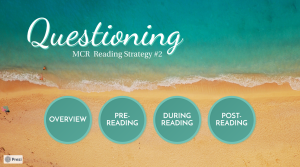18 Asking Questions
Learning Objectives
-
Practice asking questions about literature and informational texts to help strengthen reading comprehension.
-
Cite specific textual evidence to support inferences and conclusions drawn from the text.
Chapter & Discussion
This chapter includes a presentation that can be navigated in a classroom setting or independently. You can access the presentation via the link below.
Strategy Two: Asking Questions
Work through the different sections of the chapter and discuss ideas and topics as they arise. If you’re working independently, take notes instead. Notes and active discussion will be helpful in navigating this week’s assignments.
Overview
Quick Review: Metacognitive Reading Strategies are ways to practice reading comprehension by being self-aware.
Today, we’ll discuss Strategy #2: Questioning. When readers ask questions as they read, they are not only interacting with the text to make meaning of it, but they are also monitoring their own comprehension of what they are reading.
What types of questions should we ask when we read? How can we develop this strategy into a routine?

Pre-Reading
These prompts can help us to form some useful questions before we start reading.
- Think about what will happen next
- Consider what the characters want (intentions) and what obstacles stand in their way
- Based on your last reading, try to summarize the score- where things stand and what circumstances shape our characters’ choices
- Think about vocabulary and concepts related to the topic
While Reading
These prompts can help us to form some useful questions while we read.
- Try to summarize key points from paragraphs or sections of the text
- Use wh- questions (who, what, where, when, why, how) about details in the text
- Try to clarify unclear parts and predict what’s coming next
- Generate questions about main ideas to check comprehension

After Reading
These prompts can help us to form some useful questions after we read.
- Use analysis questions requiring deeper thinking (“Why did the author write this story?”)
- Try to articulate key takeaways from the reading
- Look at the devices that the author used and try to guess how they helped with the story’s goals
- Reflect on how the reading relates to your own knowledge and experiences
Assigned Reading
Here are this week’s readings. Additionally, please read for your own personal enjoyment for 1/2 hour each day. This will be called your “Reading Zone” reading and it will coincide with many upcoming activities.
6 Types of Reading Questions by Carie Palmer and Shirley Shultz Myers (via Galludet University)
Problem Set: Practice Your Skills!
Click here to complete a ten-question problem set on concepts in this chapter.
Completing problem sets like this can be an important element of independent study towards completing your HSE. I write these to resemble the style of questions you’ll find on the Reading and Language Arts GED.
Assignment: Questions Inventory (250 Words)
Look over the reading this week from Galludet University. Think of eight questions you have about your Reading Zone book. Write them down. For each:
-
Explain what category your question falls into (from the reading)
-
Attempt to answer your question based on what you know
-
See if your question leads to a prediction
Assignment: Reading Zone Response (250 Words)
For Reading Zone, you must find a novel that is interesting to you and enjoyable to read. If you need help finding a Reading Zone book, please ask. Please read your Reading Zone book for a half-hour each day. On class days, there will be time in class dedicated to reading.
Create a two-paragraph response to the reading you did this week. The first paragraph should summarize what you read this week. The second paragraph should address the following prompt:
From what you’ve read so far, what are some main ideas or themes? What has been confusing or unclear so far? What are some topics the author explores? What do you think the author has to say about those topics?
Attributions
Duke, N. K., & Pearson, P. D. (2002). Effective practices for developing reading comprehension. In A. E. Farstrup & S. J. Samuels (Eds.), What research has to say about reading instruction (3rd ed) (pp. 205-242). Newark, DE: International Reading Association. Reprinted in Journal of Education, 189, 107-122.
Mills, Kathy A. (2008) The Seven Habits of Highly Effective Readers. In Proceedings Stories, Places, Spaces: Literacy and Identity, National conference by the Australian Literacy Educators’ Association (ALEA) and Australian Association for the Teaching of English, Adelaide, SA.


